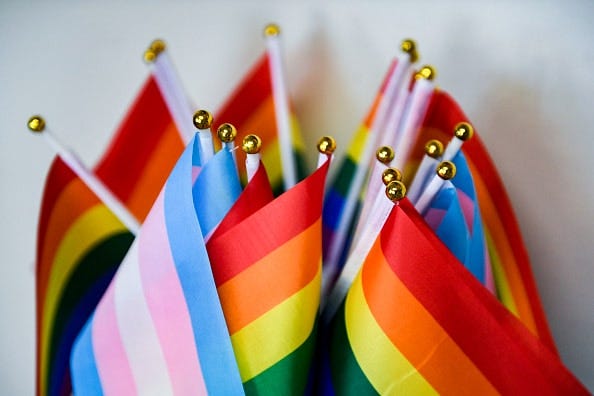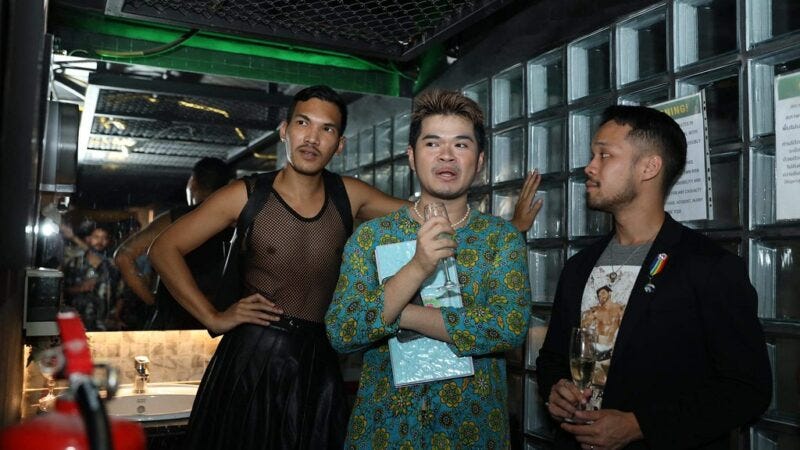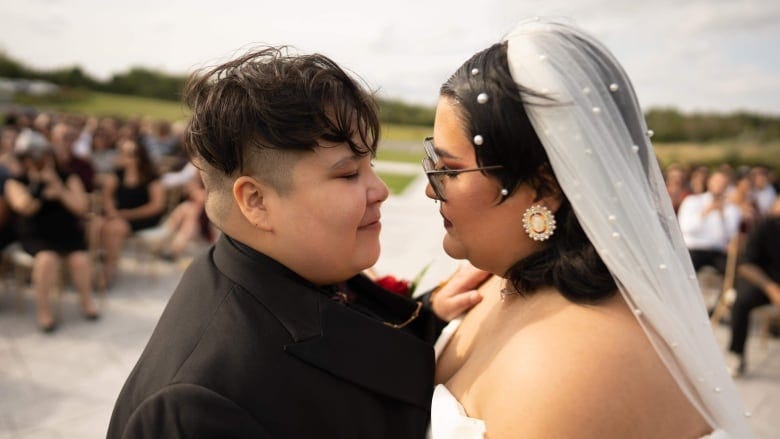Global Roundup: Bangladesh Woman Asia’s First Heat Officer, Mauritius LGBTQ+ Community, Ecuador Femicide Report, Thailand Queer Artist, Indigenous Newlyweds Destigmatize Queer Love
Curated by FG Contributor Samiha Hossain
Bushra Afreen, heat officer of Dhaka North, Bangladesh. Photograph: Noor Alam/Guardian
Bushra Afreen has taken on a new role, the first of its kind in Asia: chief heat officer for Dhaka North in Bangladesh. The 30-year-old joins an all-female network of heat officers in cities around the world, including Miami; Athens; Melbourne; Chile’s capital, Santiago; Freetown in Sierra Leone; and the Mexican city of Monterrey. Her appointment is part of an initiative led by the Atlantic Council’s Adrienne Arsht-Rockefeller Foundation Resilience Center (known as Arsht-Rock) to help city administration departments coordinate their response to extreme heat and better protect their residents. Chief heat officers are tasked with accelerating heat-protection efforts and initiating new work to reduce the risks and impact of the changes.
This year, temperatures in Dhaka hit 40.6C (105F) – the highest in six decades – leading to a rise in hospital admissions and at least 20 deaths, though this is likely to be an underestimate. Scientists believe global warming has made such heatwaves at least 30 times more likely for Bangladesh and India.
Every year, extreme heat is responsible for more deaths across the globe than any other climate hazard…Accurate data is difficult to come by. That’s certainly the case for Dhaka. But I am working with the city’s health officials to get a better understanding of the effects of extreme heat on people’s health. -Bushra Afreen
Low-income workers are particularly vulnerable. Hazera Khatun, 48, works as a waste recycler and is exposed to dangerous heat and fumes all day long. During the recent heatwave, she fainted three times in one week. Khatun lives in Korail, Dhaka’s largest slum, bordering Gulshan and Banani, two of Dhaka’s most affluent neighbourhoods.
I had to take time off as I felt too weak to carry on. My family really struggled that week…Only the rich can afford to bear this heat. - Hazera Khatun
One of the initiatives Afreen is working on is an urban greening project, which involves planting 200,000 trees over two years, including within slums, or “informal settlements”. She says there are more than 100 “water ATM booths”, where people can get cheap drinking water, in north Dhaka, which she is looking to expand across the city. She also wants to create a “cool map” to help citizens access the nearest water booth or cooling centre – temporary air-conditioned spaces set up to offer respite from the heat when temperatures rise to dangerous levels. However, expanding infrastructure takes time and Afreen recognizes that the issue is only getting worse – with women and girls facing the brunt of it.
Extreme heat is also contributing to a rise in gender-based violence and severe health issues for women. When we understand the impacts of extreme heat and invest in gender-informed solutions, only then can we build toward a cooler, more equitable future – especially for women and girls. -Hazera Khatun
The nation’s Supreme Court ruled in favour of the decriminalisation as part of the case of Ah Seek vs State of Mauritius, which saw activist Abdool Ridwan Firaas Ah Seek sue the state with the support of the Human Dignity Trust, to challenge section 250 (1) of the Mauritian Criminal Code 1838. The outdated law, which had been introduced by the British during the colonial period, criminalised same-sex relations and threatened a maximum penalty of five years imprisonment. The court noted that the colonial-era law was not made to reflect Mauritian values, but “inherited as part of our colonial history from Britain.”
This decision finally topples 185 years of state-sanctioned stigma against LGBT people in Mauritius and sends yet another important message to the remaining criminalizing countries in Africa and beyond: these laws must go. - Téa Braun, Human Dignity Trust
Human Dignity Trust also acknowledged that, while the law was “largely obsolete” and there was “no evidence of the law being enforced for many years in cases of consensual sexual activity between people of the same sex,” its “mere existence” constituted a “violation of human rights” that encouraged “further acts of discrimination.” Plaintiff Ah Seek, who initiated the lawsuit back in 2019, is relieved about the ruling.
From today, as a citizen and a human being, I am now free to love whoever I want to without fear. Above all, it also means that the next generations can fully and freely embrace their sexuality without fear of being arrested. This victory is undoubtedly a major step towards the full inclusion of our community in Mauritian society. -Abdool Ridwan Firaas Ah Seek
Artists carry out a performance to denounce feminicide in Ecuador, April 2023. | Photo: X/ @PrisSchettini
The organizations said that 1,617 femicides have been recorded since 2014, when Ecuador recognized femicide as a crime related to patriarchal violence. This year, the youngest victim was a baby less than one year old, and the oldest was a 90-year-old woman. A concerning aspect noted this year is 130 femicides committed by criminal networks, a figure surpassing femicides related to intimate matters and transfemicides. This underscores the importance of addressing both domestic violence and the new contexts of gender-based violence in organized crime environments, as explained by ALDEA. Additionally, highlighting an "alarming" statistic emerging from the analysis of femicides in Ecuador this year, it is noted that "68% of these crimes were committed using firearms."
The Ecuadorian state does not effectively fulfill its obligations, does not guarantee rights, nor prevent gender-based violence. It does not protect those demanding answers to acts of violence and does not ensure access to justice. -ALDEA
The humanitarian NGO called on all of Ecuadorian society to join the cause in search of truth, justice, and reparation, "but, above all, to prevent this violence from recurring in the future. There is no possible justification for femicidal violence."
26-year-old Patthakarn Sadubtham (middle). Photo via Prachatai.
26-year-old Patthakarn Sadubtham is an emerging queer artist in Thailand. His aim is to challenge societal norms by bringing taboo subjects to the foreground through his photography, which focuses on unconventional sexual desires. Some of his art can be found on the walls of Krubb, a sauna catering to the specific needs of gay men in Bangkok.
Patthakarn's work often defies conventional gallery spaces. Nevertheless, it had managed to find its way into three exhibitions: two in Bangkok and one in Phayao. The exhibition BoyXTherapy at Krubb marks his solo debut. The building, which houses a sauna, fitness area, and two floors of dark rooms set aside for all imaginable sexual activities, has been transformed into an impromptu art gallery for pieces that center around kinks and desires that live in the shadows.
Discrimination against the queer community is still ubiquitous in Thailand, so Patthakarn tries to use art as a medium to alleviate the hardships that many gay individuals, some still compelled to remain in the closet, have had to endure. He believes that his work can help to normalize taboos. He hopes that his efforts will empower queer artists passionate about sexuality and sexual themes to step forward and express themselves.
The young artist acknowledges that his art may sometimes veer into the realm of the obscene, but that, for him, is acceptable. He believes that aesthetically, there may not be a significant difference between art and pornography. This doesn't pose a problem for him. His limit, he emphasizes, is not defined by decency but by consent.
I'm willing to push the limit, but it ultimately boils down to consent. If both parties agree, then it's okay. If not, it ends there. It's the audience's responsibility to deal with their own feelings towards arts.-Patthakarn Sadubtham
Annie Decontie, left, Falicia Green, right, tied the knot on Sept 2. Darren Brown/Kathi Robertson Weddings
Annie Decontie is a Cree-Algonquin who works hosting sexual health workshops in the Cree communities of northern Quebec. Falicia Green is Ojibwe from Ontario who is a youth advocate and has worked as a sexual health social aid worker. The couple tied the knot last month, in Ottawa. While it was a day filled with joy, the couple also decided to have their wedding off territory, so they could feel safe on their special day.
The homophobia the couple faced was not only from strangers. Decontie first came out to their grandmother when they knew things were getting serious as a couple. Their grandmother shunned them and told them not to bother coming home for a visit.
The couple travels together to Cree communities to engage youth to talk about healthy relationships, consent and gender identity. They also train healthcare professionals around two-spirit and LGBTQ sensitivity to help organizations be more inclusive. They say that access to sexual health workshops are a form of suicide prevention and harm reduction.
It's going to be difficult when it comes to learning, unlearning and relearning ... but it's not impossible. -Falicia Green
Their message to Indigenous youth who may be questioning their gender identity or sexual orientation? You are not alone.
There is absolutely nothing wrong with you ... and if you have family that doesn't accept you, we're your family now. -Annie Decontie
Samiha Hossain (she/her) is an aspiring urban planner studying at Toronto Metropolitan University. Throughout the years, she has worked in nonprofits with survivors of sexual violence and youth. Samiha firmly believes in the power of connecting with people and listening to their stories to create solidarity and heal as a community. She loves learning about the diverse forms of feminist resistance around the world.






